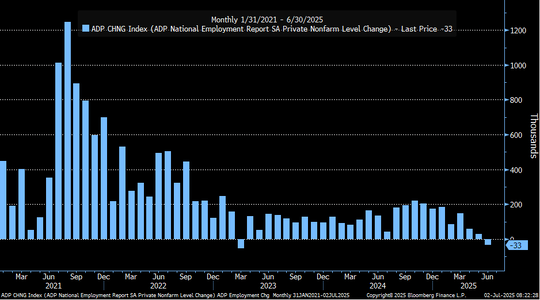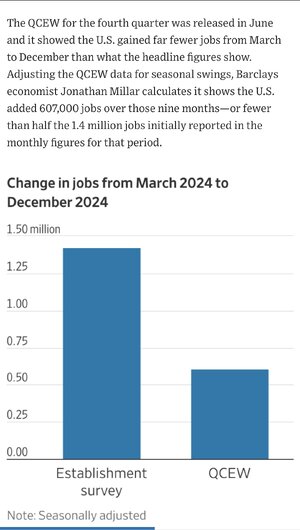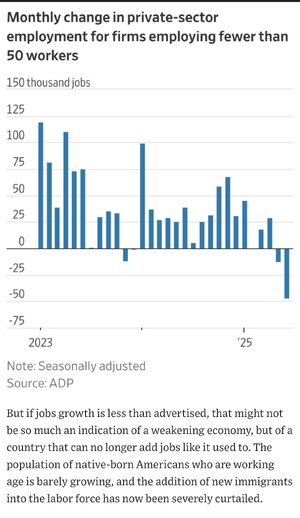Navigation
Install the app
How to install the app on iOS
Follow along with the video below to see how to install our site as a web app on your home screen.
Note: This feature may not be available in some browsers.
More options
You are using an out of date browser. It may not display this or other websites correctly.
You should upgrade or use an alternative browser.
You should upgrade or use an alternative browser.
Economic News
- Thread starter nycfan
- Start date
- Replies: 5K
- Views: 213K
- Politics
aGDevil2k
Inconceivable Member
- Messages
- 4,726
And the ADP article says layoffs remain rare? I mean damn. I know I am in tech, which is different than some other industries, but layoffs are everywhere all the time
- Messages
- 4,106
ADP data showed US private employers unexpectedly cut 33,000 jobs in June, badly missing expectations of around 98,000 jobs added. It was the first month of job losses in the private sector in over two years.
will be interesting to see the jobs report which is typically released on the first Friday of the following month which will be July 4th
will the report be released on a holiday
- Messages
- 41,384
ADP numbers are notoriously erratic but definitely a surprise.ADP data showed US private employers unexpectedly cut 33,000 jobs in June, badly missing expectations of around 98,000 jobs added. It was the first month of job losses in the private sector in over two years.
will be interesting to see the jobs report which is typically released on the first Friday of the following month which will be July 4th
will the report be released on a holiday
- Messages
- 41,384
ADP numbers are notoriously erratic but definitely a surprise.
“… The May job growth figure was revised even lower to just 29,000 jobs added from 37,000….”
——
During the 2024 election, adjustments to monthly and quarterly jobs data was evidence of a massive government conspiracy to reelect Biden (then Harris). Now it is back to being ordinary course as data co tinies to come in after the initial report date.
——

lawtig02
Legend of ZZL
- Messages
- 5,890
This is anecdotal and may be wrong but it appears to me companies have cut way back on hiring. They're not replacing resignations/retirements. If that continues, it will be another kick in the balls for Gen Z.ADP numbers are notoriously erratic but definitely a surprise.
StoneColdHeel
Legend of ZZL
- Messages
- 5,844
Analysis shows Trump's tariffs would cost US employers $82.3 billion

 www.wral.com
www.wral.com

Analysis shows Trump's tariffs would cost US employers $82.3 billion
WASHINGTON (AP) — An analysis finds that a critical group of U.S. employers would face a direct cost of $82.3 billion from President Donald Trump’s current tariff plans, a sum that could be potentially managed through price hikes, layoffs, hiring freezes or lower profit margins.
- Messages
- 41,384
Definitely have seen several reports of reduced hiring for entry level jobs. Several of those stories are posted somewhere in this thread. So you are observing something that the data supports.This is anecdotal and may be wrong but it appears to me companies have cut way back on hiring. They're not replacing resignations/retirements. If that continues, it will be another kick in the balls for Gen Z.
- Messages
- 41,384
The Jobs Market Is Starting to Fall Apart
Even if Thursday’s jobs report comes in strong, a look behind the headline number tells a different story
“The U.S. has been adding jobs at a respectable clip, though the pace has been slowing. Economists expect that the Labor Department’s monthly jobs report on Thursday will show that the economy added 110,000 jobs in June.
This year through May, the U.S. has added an average of 124,000 jobs a month. That is down from last year’s average of 168,000 a month—a reflection in part of how stop-start tariffs, government layoffs and an immigration crackdown could be catching up to the job market. More fundamentally, slow population growth and an aging workforce make it harder for the U.S. to add jobs like it did in the past.
… People who have jobs are keeping them, but those who want jobs are having a tough time finding work. That includes recent high-school and college graduates, people who are back on the job hunt after an absence, and those who have been fired.
… For January through April, the Labor Department has so far revised down the monthly employment gains by an average of 55,000 jobs. March went from a headline of 228,000 jobs added when it was first announced, to 185,000 when it was first revised, to 120,000 when it was revised again….
[QCEW = US Government Quarterly Census of Employment and Wages]

… The survey of businesses—what economists call the establishment survey—shows that the U.S. added about 1.7 million jobs over the 12 months ended in May. But comparable numbers from the household survey show a smaller gain of about 1 million jobs.
To be fair, economists usually prefer the establishment survey for counting jobs. That, after all, is what it is designed to do. Still, the household survey is another yellow flag. …”
- Messages
- 41,384
The Jobs Market Is Starting to Fall Apart
Even if Thursday’s jobs report comes in strong, a look behind the headline number tells a different story
—> https://www.wsj.com/economy/jobs/jo...6?st=BAsbZ5&reflink=desktopwebshare_permalink
“The U.S. has been adding jobs at a respectable clip, though the pace has been slowing. Economists expect that the Labor Department’s monthly jobs report on Thursday will show that the economy added 110,000 jobs in June.
This year through May, the U.S. has added an average of 124,000 jobs a month. That is down from last year’s average of 168,000 a month—a reflection in part of how stop-start tariffs, government layoffs and an immigration crackdown could be catching up to the job market. More fundamentally, slow population growth and an aging workforce make it harder for the U.S. to add jobs like it did in the past.
… People who have jobs are keeping them, but those who want jobs are having a tough time finding work. That includes recent high-school and college graduates, people who are back on the job hunt after an absence, and those who have been fired.
… For January through April, the Labor Department has so far revised down the monthly employment gains by an average of 55,000 jobs. March went from a headline of 228,000 jobs added when it was first announced, to 185,000 when it was first revised, to 120,000 when it was revised again….
[QCEW = US Government Quarterly Census of Employment and Wages]
… The survey of businesses—what economists call the establishment survey—shows that the U.S. added about 1.7 million jobs over the 12 months ended in May. But comparable numbers from the household survey show a smaller gain of about 1 million jobs.
To be fair, economists usually prefer the establishment survey for counting jobs. That, after all, is what it is designed to do. Still, the household survey is another yellow flag. …”

- Messages
- 4,106
Microsoft is planning to layoff 9,000 workers...to be replaced by AI ?Definitely have seen several reports of reduced hiring for entry level jobs. Several of those stories are posted somewhere in this thread. So you are observing something that the data supports.
- Messages
- 4,106
I still blame Jimmy Carter...This is very bad for Joe Biden!
superrific
Master of the ZZLverse
- Messages
- 12,405
Oh, this "we can't create new jobs" bullshit is just that -- bullshit. Actually, that's what I thought before running the numbers. The data suggests something a bit different.
3.9 million Americans graduated high school this year. It's been at least 3.7M every year since 2018.
In 1960, there were 4.2M births. According to actuarial tables, a bit less than 3/4 of the 1960 births are still alive. So that's about three million people, maybe 3.1. According to data, the labor force participation rates during prime years of people born in 1960 was about 85%. That's not how many are working today; that's how many were in the labor force at some point during their adult years. So 15% of people can't be working today because they never really had jobs. So that 3 million gets knocked down to about 2.6M. In other words, the upper limit on retirees is about 1.5M less than new labor force entrants.
College doesn't make a difference statistically, given that college attendance rates and high school graduation rates have not really moved in the last 8-10 years. So the number of people entering the workforce from college (whether graduate or dropout) is roughly the same as people going to college. Retirements are the same story: some people who turn 65 this year are already retired; some won't retire until a few years from now, and those numbers would be probably similar. If anything, the early retirements would likely outnumber the late retirements but this is probably a wash at the accuracy level of these calculations. And birth rates were similar in 1958, 1960 and 1962 so that isn't going to make much difference either.
So by my calculations, 18 year old Americans graduating high school this year outnumber retirees by 1.5M. That doesn't fully describe the effect on the job market, because of the possibility of non-retirement disappearance from labor force for people under 65, but whatever. Add back in immigrants who are turning 65, which I estimate at about 500-600K based on similar data and approaches, and subtract out the 50K or so emigrants to get a net workforce increase of about 1 million workers, maybe a little more.
So let's call it 100K per month. That's the no-change-to-full-employment number of jobs to be expected, which I guess is sort of what we're seeing. There are probably more ways of exiting the workforce than I know, so my estimate is likely low. Also, birth rates went down a lot between 1960 and 1967. The median retirement age is about 62, but I don't know about the skew. If the boomers retired slightly on the younger side -- for instance, as in the pandemic -- then my estimate would be too low because I would be overcounting retirements.
I'm not taking account of undocumented workers because they should wash out of the data, as they aren't really counted anyway.
3.9 million Americans graduated high school this year. It's been at least 3.7M every year since 2018.
In 1960, there were 4.2M births. According to actuarial tables, a bit less than 3/4 of the 1960 births are still alive. So that's about three million people, maybe 3.1. According to data, the labor force participation rates during prime years of people born in 1960 was about 85%. That's not how many are working today; that's how many were in the labor force at some point during their adult years. So 15% of people can't be working today because they never really had jobs. So that 3 million gets knocked down to about 2.6M. In other words, the upper limit on retirees is about 1.5M less than new labor force entrants.
College doesn't make a difference statistically, given that college attendance rates and high school graduation rates have not really moved in the last 8-10 years. So the number of people entering the workforce from college (whether graduate or dropout) is roughly the same as people going to college. Retirements are the same story: some people who turn 65 this year are already retired; some won't retire until a few years from now, and those numbers would be probably similar. If anything, the early retirements would likely outnumber the late retirements but this is probably a wash at the accuracy level of these calculations. And birth rates were similar in 1958, 1960 and 1962 so that isn't going to make much difference either.
So by my calculations, 18 year old Americans graduating high school this year outnumber retirees by 1.5M. That doesn't fully describe the effect on the job market, because of the possibility of non-retirement disappearance from labor force for people under 65, but whatever. Add back in immigrants who are turning 65, which I estimate at about 500-600K based on similar data and approaches, and subtract out the 50K or so emigrants to get a net workforce increase of about 1 million workers, maybe a little more.
So let's call it 100K per month. That's the no-change-to-full-employment number of jobs to be expected, which I guess is sort of what we're seeing. There are probably more ways of exiting the workforce than I know, so my estimate is likely low. Also, birth rates went down a lot between 1960 and 1967. The median retirement age is about 62, but I don't know about the skew. If the boomers retired slightly on the younger side -- for instance, as in the pandemic -- then my estimate would be too low because I would be overcounting retirements.
I'm not taking account of undocumented workers because they should wash out of the data, as they aren't really counted anyway.
- Messages
- 5,217
Think it's a combo of a few things:
1. Boomers living in their own homes longer than previous generations
2. The population bomb which was millennials aging into ownership compared to the relatively small Gen X
3. Air BnB/ Verbo
superrific
Master of the ZZLverse
- Messages
- 12,405
The easiest explanation is population increased faster than housing.Think it's a combo of a few things:
1. Boomers living in their own homes longer than previous generations
2. The population bomb which was millennials aging into ownership compared to the relatively small Gen X
3. Air BnB/ Verbo
- Messages
- 8,287
Yea, according to Trump Joe is still the one making decisions. Maybe we should have just kept Joe.This is very bad for Joe Biden!
Share:
